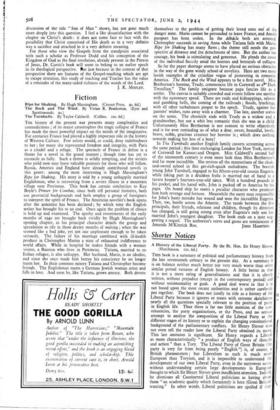Fiction
Ripe for Shaking. By Hugh Massingham. (Cresset Press. gs. 6d.) The Rock and The Wind. By Vivian R. Bretherton. (Eyre and Spottiswoode. 9S.)
The Turnbulls. By Taylor Caldwell. (Collins. Jos. 6d.)
THE history of the present war presents many complexities and contradictions ; of its major catastrophes the tragic collapse of France has made the most powerful impact on the minds of the imaginative. For centuries France had played a highly important role in the history of Western Culture. Few artists would, or could, deny indebtedness to her ; for many she represented freedom and integrity, with Paris as a citadel and a refuge. The spectacle of France in defeat is a theme for a novel in the grand manner ; though time has yet to reconcile us fully. Such a theme is wildly tempting, and the writers who yield now may leave valuable pointers for those who will follow. Russia, America and England have already contributed novels in this genre: among the most interesting is Hugh Massingham's Ripe for Shaking. His story is told by a young unhappily married Englishman, who is recovering from a severe illness in a mountain village near Perrineau. This book has certain similarities to Kay Boyle's Primer for Combat, since both tell personal histories, both use provincial backgrounds and both employ a group of foreigners to interpret the spirit of France. The American novelist's book opens after the armistice has been declared ; by which time the English writer has brought his to an end. Once again the problem of choice is held up and examined. The apathy and resentments of the early months of 194o are brought back vividly by Hugh Massingham's opening chapter, as his principal character details the gossip and
speculation so rife in those dreary months of waiting; the war seemed like a bad joke, yet not one unpleasant enouh to be taken seriously. The failure of his marriage combined with ill-health produce in Christopher Martin a state of exhausted indifference to world affairs. While in hospital he makes friends with a woman visitor, a Russian who lives in Perrineau. Tatiana, married to an Italian refugee, is also unhappy. Her husband, Mario, is an idealist, and since she once made him betray his conscience he no longer trusts her. In their common misery Tatiana and Christopher become friends. The Englishman meets a German Jewish woman artist and falls in love. And soon he, like Tatiana, grows uneasy. Both devote
themselves to the problem of getting their loved ones out of the danger zone. Mario cannot be persuaded to leave France, and Anna', passport has been stolen. In the debacle both are arrested. Christopher succeeds in saving Anna while Tatiana fails with Mario. Ripe for Shaking has many flaws ; the theme still needs the per- spective of distance and the detachment of time. But the author has courage, his book is stimulating and generous. He pleads the cause of the individual fiercely amid the horrors and betrayals of collapse.
So far the paper shortage seems to have placed no serious obstacles in the way of the gone windy school of novelists. Here are two more lavish examples of the crinoline vogue of pioneering in romantic America. The Rock and the Wind appears to be a first novel. Miss Bretherton's heroine, Trudy, commences life in Cornwall as al" Dark Tresellian." The family emigrate because papa fancies life as a settler. The canvas is suitably crowded and events follow one another with the customary speed. There are raids and kidnappings, saloons and gambling hells, the coming of the railroads; floods, lynchings, with all other turbulences proper to the epoch. Trudy, against her parents' wishes, runs away with a charmer. Too late, another comes on the scene. The chronicle ends with Trudy as a widow and a grandmother, but not a whit less romantic thah she was as a child. Unfortunately Miss Bretherton is not content to write objectively and is for ever reminding us of what a dear, sweet, beautiful, lovely. brave, noble, gracious creature her heroine is ; which does nothing towards making her less of a bore!
In The Turn bulls another English family cavorts screaming across the same period ; this time exchanging London for New York, instead of Cornwall for Kansas)and Oregon. Miss Caldwell's second half of the nineteenth century is even more lush than Miss Bretherton's and far more incredible. She revives all the mannerisms of the cloak- and-sword school in this get-rich-quick melodrama. The boorish young John Turnbull, engaged to his fifteen-year-old cousin Eugenia, while taking part in a drunken frolic is married out of hand to a tavern keeper's fourteen-year-old niece. With a hundred pounds in his pocket, and his hated wife, John is packed off to America by his papa. On board ship he meets a peculiar character who promises him both revenge and fortune. Meanwhile the nasty man responsible for John's hasty mistake has wooed and won the incredible Eugenia. They, too, hustle across the Atlantic.. The tussle between the five principals, their friends, relations and children, though its direction has changed, is still going strong even after Eugenia's only son has married John's youngest daughter. The book ends on a note sug- gesting a sequel. The authoress's verve and gusto are reminiscent at


























 Previous page
Previous page